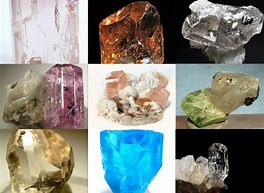Buying jewelry can be confusing when you hear the terms organic, natural, or genuine. The terms mean different things in the jewelry industry. Basically they all mean that the primary gemstone in a setting is not man-made (aka synthetic, imitation, faux or CZ). However, lab-created and farm-raised may seem man-made, but they are considered genuine since they are gemstones that man has merely helped along in the growing process yet still have the same chemical make-up of the stones that occur naturally (i.e. in nature). Often the lab-created look better than the nature-made versions of the same gemstone because the lab-environment is prefect conditions for growth, whereas anything can happen in nature to cause inclusions or cloudiness.
Still confused? The primary difference between genuine and natural gemstone classification is whether the stone been enhanced in some way. A natural gemstone has not had an enhancement or treatment to make it better looking. Natural is merely mined, cut/shaped, possibly faceted, and polished to be placed into a setting. Common enhancements/treatments to change natural stones include: Dying (D) /Difusion, , Fissure Filling (FF), Heat Treating (HT), oiling, sealing, stabilizing, and Irradiation (IR).
So now you are thinking every natural stone must also be organic. Sorry, not so. Organic means it was once a living thing instead of a mineral or rock. Therefore it must be plant-based or from an animal/insect. There are very few gemstones that qualify as organic, although it does include the popular stones of amber, coral, and pearls.
To make things even more convoluted, you have precious gemstones and semi-precious gemstone classifications!
Still confused? The primary difference between genuine and natural gemstone classification is whether the stone been enhanced in some way. A natural gemstone has not had an enhancement or treatment to make it better looking. Natural is merely mined, cut/shaped, possibly faceted, and polished to be placed into a setting. Common enhancements/treatments to change natural stones include: Dying (D) /Difusion, , Fissure Filling (FF), Heat Treating (HT), oiling, sealing, stabilizing, and Irradiation (IR).
So now you are thinking every natural stone must also be organic. Sorry, not so. Organic means it was once a living thing instead of a mineral or rock. Therefore it must be plant-based or from an animal/insect. There are very few gemstones that qualify as organic, although it does include the popular stones of amber, coral, and pearls.
To make things even more convoluted, you have precious gemstones and semi-precious gemstone classifications!

No comments:
Post a Comment